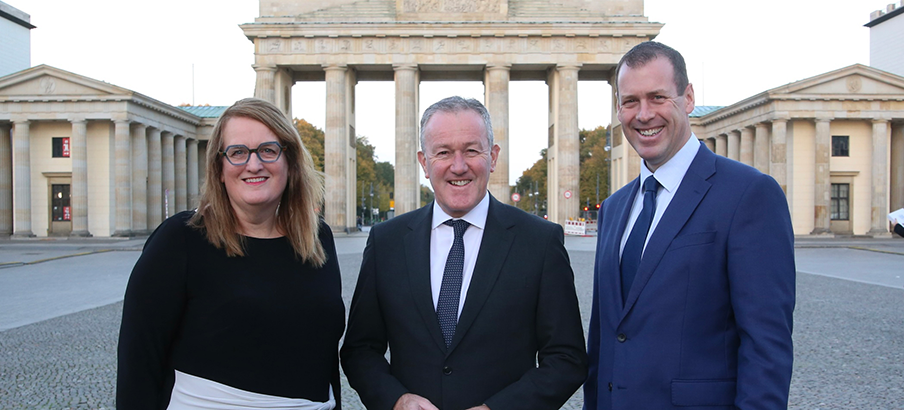Setting out NI’s competitive offering for investment

(L-R) Peta Conn, Head of GB and Europe, Invest Northern Ireland; Conor Murphy, Minister for the Economy and Steve Harper, Executive Director of International Business, Invest Northern Ireland, pictured on a two-day visit to Germany.
Steve Harper, Invest Northern Ireland’s executive director, international and skills, sets out Northern Ireland’s unique competitive position.
Following the United Kingdom’s (UK) decision to leave the European Union (EU), Northern Ireland has found itself in a unique position – access for goods to the EU market on the same basis as pre-EU exit and unfettered access to the UK’s internal market. It’s what we refer to as ‘dual market access’.
Our team across Europe have found many EU businesses with little or no awareness of the Northern Ireland Protocol and Windsor Framework. Many assume that, as part of the UK, our manufacturers are subject to the same trading arrangements as the rest of the UK which means trading under the UK-EU Trade and Co-operation Agreement (TCA), incurring additional costs and administration.
Equally, we have come across EU buyers and suppliers who have chosen not to do business with our local companies due to the perceived additional administrative burden of trading under the TCA or World Trade Organization (WTO) terms.
Locally, we have also seen that some local businesses are not fully aware of the relative competitive advantage they have over Great Britain (GB) and EU based competitors servicing these markets.
This means that there are missed opportunities by both Northern Ireland and EU businesses.
Our unique dual market access position is something that we are talking to international business about from both a foreign direct investment (FDI) perspective and from an export/trading position.
It’s not a one-size fits all proposition and will vary depending on the company’s requirements, their industry, and their geographic location.
While dual market access is an important factor, it is only part of the business decision making process. Potential inward investors will also want to hear about our skills availability, lower operating costs, infrastructure details and what support is available.
From a trade perspective, buyers are interested in quality, cost, deliverability.
Whilst it is still relatively early days of the post-EU exit era there are signs that Northern Ireland is fairing better than other parts of the UK in terms of manufacturing exports to the EU. From 2022 to 2023, our manufacturing exports to the EU increased by 14%. By contrast, exports from Wales were largely flat, those from England declined by 4% and Scottish exports were down by 11%.
We have seen growth in exports to the EU across almost all parts of Northern Ireland, with Derry and Strabane achieving the highest growth of nearly 33%.
Our businesses are also diversifying where they export to, with a number of non-traditional EU export markets seeing an uplift in products sourced from here, including Denmark, Poland, Portugal and Bulgaria.
Our dual market access position gives Northern Ireland a unique competitive advantage that we are keen to maximise for both local businesses and internationally, as we continue to spread the message and educate the market about our proposition.
This feature first appeared in Ulster Business in November 2024.
For further information on selling outside Northern Ireland, and to receive your free bespoke Export Health Check report, visit out Go Further, Grow Stronger webpage.




Comments